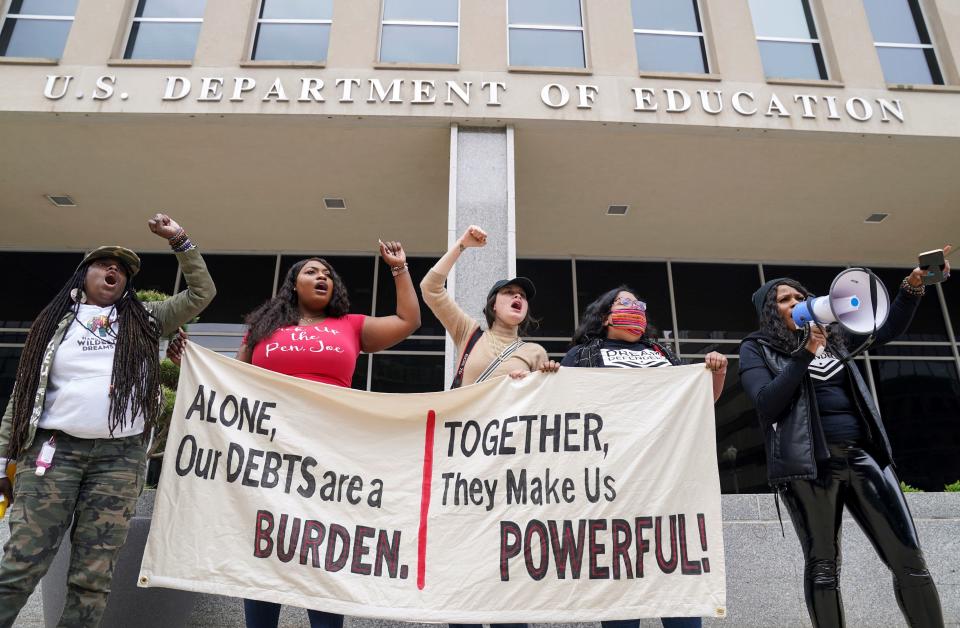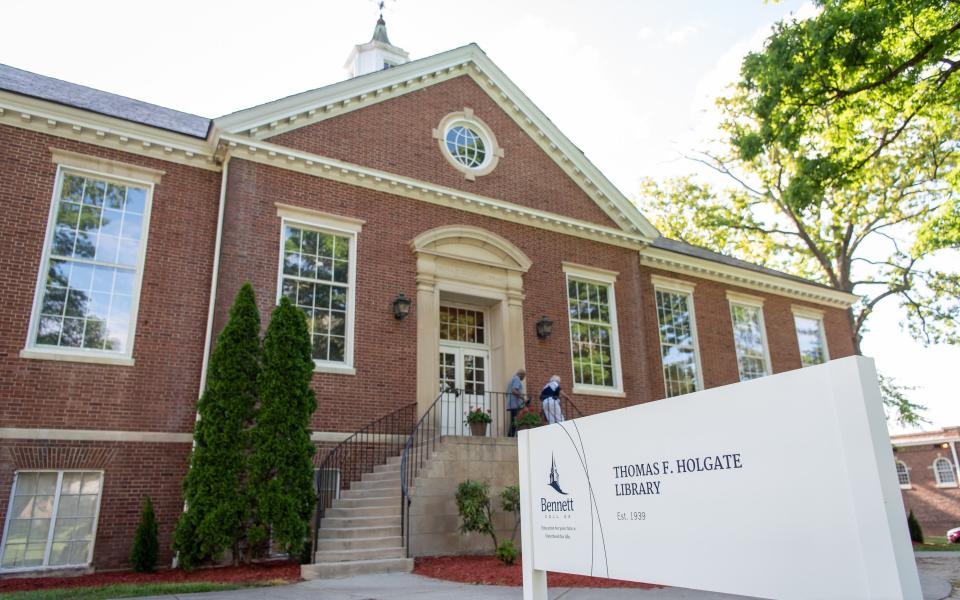Occupy Wall Street activists pay off student debt for nearly 500 Black women at HBCU
Suzanne Walsh, president of Bennett College, at first ignored the email that would lead to the cancellation of nearly 500 overdue bills at her college. After all, she thought at the time, "people just don't reach out and say we can help your students pay off their debts."
But the Debt Collective, a union of debtors rallying against consumer debt, wasn't joking. After the initial conversation, the group arranged for the purchase of $1.7 million in unpaid student balances.
Then they canceled it. Its elimination means students no longer have to pay off the debt and those who couldn't access their transcripts because of overdue bills now have access to their academic records and the ability to continue their educations.
Braxton Brewington, a spokesman for the organization, said they chose Bennett College in North Carolina because Black women on average have higher student loan balances than any other group of borrowers. The debt cleared does not include federal student loans, only money owed directly to the school.
"These are the people that are really taking the brunt of the student debt crisis," Brewington said.

The deal comes at a time when the Debt Collective and other progressive groups are calling on President Joe Biden to cancel all federal student loan debt. Biden had campaigned on forgiving up to $10,000 in debt per borrower, and is mulling some version of widespread forgiveness. He had also supported forgiving the federal student loan debt of middle and low-income students who attended an HBCU.
Throughout the COVID pandemic, the federal government has paused payments on federal student loans and set interest rates at zero percent. That moratorium, which benefits roughly 41 million borrowers, is set to expire at the end of August, though the president has extended it multiple times and is expected to do so again before the midterm elections for Congress in November.
The Debt Collective has said the pause just delays addressing the problem. The group held a protest outside of the Department of Education last month in Washington, D.C., that drew demonstrators from across the nation.
Women told they no longer owe student debt
The Debt Collective traces its origins to the Occupy Wall Street movement, a protest against income equality in 2011 that captured national attention. Some of the organizers helped to lead a group of students in 2015 who refused to pay their student loans after attending the now-closed chain of schools, Corinthian Colleges. That institution closed after the Education Department stripped it of its federal funding.
The group describes itself as a debtor’s union, with dues-paying members. It’s partially because of those funds that the collective was able to coordinate the buyout of the Bennett College debt.
The Debt Collective acquired the debt through a sister entity known as the Rolling Jubilee, a nonprofit that buys and discharges medical, carceral and other forms of consumer debt.
Bennett College pulled $1.7 million in student debts the college had sent to collections and instead allowed the Rolling Jubilee to buy it. That price? $50,000, or about three cents on the dollar. That meant the college forfeited its ability to collect on the overdue bills, but Walsh said she was excited to be able to cancel the debt for the former students.
Brewington said the group had started contacting the former students who had benefited from the relief this week to let them know they no longer owed any money. One account was connected to charges from 1996.
The debts cleared included charges for tuition costs, unpaid parking tickets or overdue library fees.
The college has a policy of holding of withholding academic transcripts for students with overdue accounts. For those who hadn't finished their studies, that could impede their ability to transfer their credits to other colleges and earn a degree.
Debt can prevent students from getting a degree
The amount of student debt was shocking to Walsh because it went against the college's goals of trying to improve the economic standing of its students.
"This was kind of a punch in the gut," she said. "This is exactly the kind of thing that gets in the way of women being successful."
Walsh said the gift prompted the college to start revising its policy of withholding transcripts over unpaid debts.
Suzette Trotmon, 34, had already suffered the consequences of that rule. She was one of the hundreds of borrowers to receive relief, though she was initially suspicious when a Debt Collective representative called her to share the news.
"I asked him if he was lying," Trotmon said. "It's more than I could ask for, especially on a Wednesday when I am about to have dinner with my family. That's good news, you don't get that every day."
Trotmon, who works part-time at the Boys and Girls Club and cares for her two-year-old child, attended Bennett for a year in 2005, and described it "as one of the best experiences in her life." The college paired her with an older student as a mentor, and she appreciated the campus' traditions. But expected support from her family didn't materialize for her second year, and she said she couldn't continue her studies or pay the current bill.
The debt not only prevented her from finishing college then, but it stalled her efforts to complete her degree later. She tried to enroll in community college programs in Baltimore, but she couldn't access her academic transcript to prove what classes she had already taken. That meant starting over, which felt discouraging and costly.
But the wiping of her debt, about $2,000, should make it easier to resume her studies, Trotmon said. And the cleared debt will help her credit score.

Bennett is one of many colleges rethinking how it treats students who owe money. Education Secretary Miguel Cardona has called on universities to end the practice of withholding transcripts over unpaid debts following reporting from GBH News and the Hechinger Report. And the Education Department has said colleges and universities can use emergency stimulus money tied to the pandemic to wipe these debts.
The Debt Collective’s model for eliminating student debts isn’t going to solve the debt crisis. Rather, Brewington said, the group’s hope is to highlight how cheaply and easily debt can be cleared.
"We are shouting from the rooftops that this is something the government should be doing, not a group of activists from Occupy Wall Street," he said.
And there are limits to the collective's work. They don't have the funding to pay off federal student loans, a reality Trotmon knows well. She still has $10,000 in federal student loan debt, and she favors mass cancelation.
"In a lot of situations, people don't even get a chance to finish," she said.
This article originally appeared on USA TODAY: Student loan relief: How one activist group is fighting college debt

